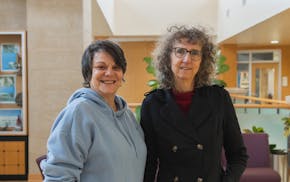John Noltner was tired of hearing people -- in politics, in the media -- talk about their conflicts and differences. For a change, he wanted to focus on what we all have in common.
So a couple of years ago, the Bloomington freelance photographer started interviewing folks on the subject of peace. Noltner deliberately left his concept open and undefined, letting his subjects decide what "peace" meant to them.
"The word comes with a lot of baggage and preconceptions, notions of hippies and rainbows and daisies," said Noltner, 44. "People don't often dig into the deeper meanings of peace, and how we can have a personal impact on that in our lives."
He interviewed activists, artists, homeless people, business executives. They shared a wide range of perspectives, often based on very personal experiences.
"A Peace of My Mind" is a collection of those 51 interviews, accompanied by Noltner's black and white portraits of each subject and an introduction by peace activist Ela Gandhi, granddaughter of Mohandas Gandhi. The coffee-table volume is being sold at 14 local and regional bookstores, as well as online (apeaceofmymind.net). The collection is also available as a traveling exhibit and online podcasts.
The response has been encouraging. Noltner hopes money from book sales will finance a sequel, this time featuring people in other countries. He's already planning a trip to Latin America to conduct interviews.
Noltner said he's been thinking about peace for a long time. But a "pivotal moment" came when he was organizing relief efforts in his church after a devastating 1998 hurricane in Honduras.
"That was the first moment when I really recognized that this society that we live in is really not a big structure but made up of all of us little individuals," he said. "If there's something out there in the world that frustrates us and that we want to change, then we should step up and make that effort to change it ourselves."
Three and out with John Noltner
When did you start thinking about the subject of peace?
When I was about 9 years old ... I remember hearing things on the news about the "evil empire" and that sort of thing. It just struck me that over across the ocean there were young kids just like myself, and that people were people. To demonize an entire nation of people because of their political leaders seemed inappropriate to me, even at that young age.
What surprised you as you did the interviews?
I thought I would get partway into this project and run out of new ways to address the issue, that things would start to get repeated. But really, everybody had such unique things to say that every interview was fresh.
How did you decide on black and white portraits?
There's something about black and white that removes some of the distractions from a shot. It reduces everything to its simplest form, photographically. And it was a way to create a consistent theme through the body of work. Other than that, all I can tell you is that I think black and white is pretty.
